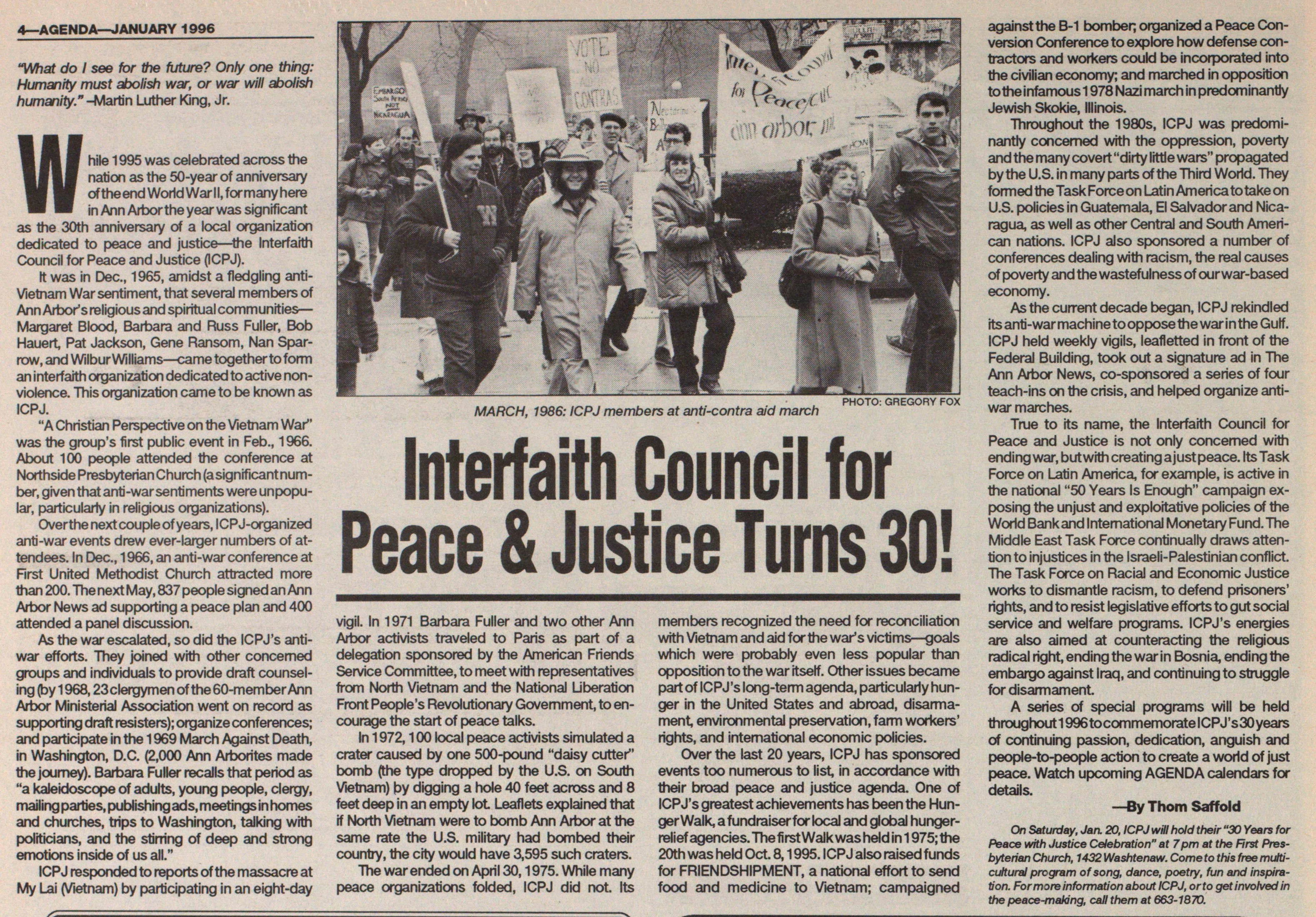Interfaith Council For Peace & Justice Turns 30!

Interfaith Council For Peace & Justice Turns 30!
4---AGENDA---JANUARY 1996
"What do I see for the future? Only one thing: Humanity must abolish war, or war will abolish humanity." -Martin Luther King, Jr.
While 1995 was celebrated across the nation as the 50-year of anniversary of the end World War ll, for many here in Ann Arbor the year was significant as the 30th anniversary of a local organization dedicated to peace and justice - the Interfaith Council for Peace and Justice (ICPJ).
It was in Dec., 1965, amidst a fledgling anti-Vietnam War sentiment, that several members of Ann Arbor's religious and spiritual communities- Margaret Blood, Barbara and Russ Fuller, Bob Hauert, Pat Jackson, Gene Ransom, Nan Sparrow, and Wilbur Williams- came together to form an interfaith organization dedicated to active nonviolence. This organization came to be known as ICPJ.
"A Christian Perspective on the Vietnam War" was the group's first public event in Feb., 1966. About 100 people attended the conference at Northside Presbyterian Church (a significant number, given that anti-war sentiments were unpopular, particularly in religious organizations).
Over the next couple of years, ICPJ-organized anti-war events drew ever-larger numbers of attendees. In Dec, 1966, an anti-war conference at First United Methodist Church attracted more than 200. The next May, 837 people signed an Ann Arbor News ad supporting a peace plan and 400 attended a panel discussion.
As the war escalated, so did the ICPJ 's antiwar efforts. They joined with other concerned groups and individuals to provide draft counseling (by 1968, 23 clergymen of the 60-member Ann Arbor Ministerial Association went on record as supporting draft resisters); organize conferences; and participate in the 1969 March Against Death, in Washington, D.C. (2,000 Ann Arborites made the journey). Barbara Fuller recalls that period as "a kaleidoscope of adults, young people, clergy, mailing parties, publishing ads, meetings in homes and churches, trips to Washington, talking with politicians, and the stirring of deep and strong emotions inside of us all."
ICPJ responded to reports of the massacre at My Lai (Vietnam) by partcipating in an eight-day vigil. In 1971 Barbara Fuller and two other Ann Arbor activists traveled to Paris as part of a delegation sponsored by the American Friends Service Committee, to meet with representatives from North Vietnam and the National Liberation Front People's Revolutionary Government, to encourage the start of peace talks.
In 1972, 100 local peace activists simulated a crater caused by one 500-pound "daisy cutter" bomb (the type dropped by the U.S. on South Vietnam) by digging a hole 40 feet across and 8 feet deep in an empty lot Leaflets explained that if North Vietnam were to bomb Ann Arbor at the same rate the U.S. military had bombed their country, the city would have 3,595 such craters.
The war ended on April 30, 1975. While many peace organizations folded, ICPJ did not. lts members recognized the need for reconciliation with Vietnam and aid for the war's victims - goals which were probably even less popular than opposition to the war itsetlf. Other issues became part of ICPJ 's long-term agenda, particularly hunger in the United States and abroad, disarmament, environmental preservation, farm workers' rights, and international economic policies.
Over the last 20 years, ICPJ has sponsored events too numerous to list, in accordance with their broad peace and justice agenda. One of ICPJ's greatest achievements has been the Hunger Walk, a fundraiser for local and global hunger relief agencies. The first Walk was held in 1975; the 20th was held Oct. 8, 1 995. ICPJ also raised funds for FRIENDSHIPMENT, a national effort to send food and medicine to Vietnam; campaigned against the B-1 bomber organized a Peace Conversion Conference to explore how defense contractors and workers could be incorporated into the civilian economy; and marched in opposition to the infamous 1978 Nazi march in predominantly Jewish Skokie, Illinois.
Throughout the 1980s, ICPJ was predominantly concerned with the oppression, poverty and the many covert "dirty little wars" propagated by the U.S. in many parts of the Third World. They formed the Task Force on Latin America to take on U.S. policies in Guatemala, El Salvador and Nicaragua, as well as other Central and South American nations. ICPJ also sponsored a number of conferences dealing with racism, the real causes of poverty and the wastefulness of our war-based economy.
As the current decade began, ICPJ rekindled its anti-war machine to oppose the war in the Gulf. ICPJ held weekly vigils, leafletted in front of the Federal Building, took out a signature ad in The Ann Arbor News, co-sponsored a series of four teach-ins on the crisis, and helped organize antiwar marches.
True to its name, the Interfaith Council for Peace and Justice is not only concerned with ending war, but with creating a just peace. lts Task Force on Latin America, for example, is active in the national "50 Years Is Enough" campaign exposing the unjust and exploitative policies of the World Bank and International Monetary Fund.The Middle East Task Force continually draws attention to injustices in the Israeli-Palestinian conflict. The Task Force on Racial and Economic Justice works to dismantle racism, to defend prisoners' rights, and to resist legislative efforts to gut social service and welfare programs. ICPJ's energies are also aimed at counteracting the religious radical right, ending the war in Bosnia, ending the embargo against Iraq, and continuing to struggle for disarmament.
A series of special programs will be held throughout 1996 to commemorate lCPJ's 30 years of continuing passion, dedication, anguish and people-to-people action to create a world of just peace. Watch upcoming AGENDA calendar for details.
--By Thom Saffold
On Saturday, Jan. 20, ICPJ hold their "30 Years for Peace with Justice Celebration" at 7pm at the First Presbyterian Church, 1432 Washtenaw. Come free multicultural program of song, dance, poetry, fun and inspiration. For more information about ICPJ, or to get involved in the peace-making, call them at 663-1870.